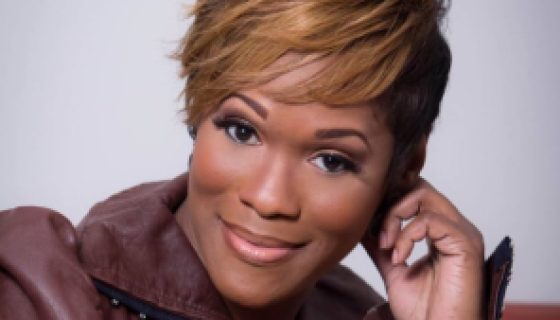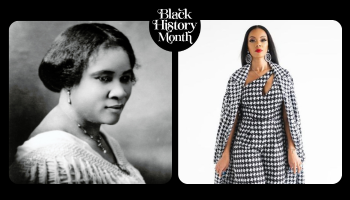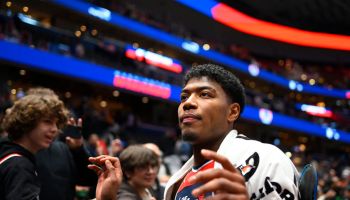
Source: J.R. Davis / WOLDCNews.Com
Muriel Elizabeth Bowser (/ˈbaʊzər/; born August 2, 1972) is an American politician serving since 2015 as the eighth mayor of the District of Columbia. A member of the Democratic Party, she previously represented Ward 4 as a member of the Council of the District of Columbia from 2007 to 2015. Elected to the Advisory Neighborhood Commission in 2004, Bowser was elected to the Council in a special election in 2007, to succeed Adrian Fenty, who had been elected Mayor. She was re-elected in 2008 and 2012 and ran for Mayor in the 2014 election. She defeated incumbent Mayor Vincent C. Gray in the Democratic primary and won the general election against three Independent and two minor party candidates with 54.53% of the vote. Bowser won re-election in 2018 with 76.4% of the vote. She is the second woman to serve as mayor, after Sharon Pratt Kelly and the first woman to be re-elected mayor of the District of Columbia. According to a Washington Post poll, the majority of D.C. residents expect Mayor Muriel Bowser to run for a third term in 2022.
Early life and education
The youngest of six children of Joe and Joan Bowser, Muriel E. Bowser grew up in North Michigan Park in northeast D.C.[3] In 1990, Bowser graduated from Elizabeth Seton High School, a private all-girls Catholic high school located in Bladensburg, Maryland. She received a college scholarship due to her above average grades. Bowser graduated from Chatham College in Pittsburgh, Pennsylvania, with a bachelor’s degree in history, and she graduated from the American University School of Public Affairs with a Masters in Public Policy. In 2015, she bought a home in Colonial Village, moving from a Riggs Park duplex where she had lived since 2000.[10] She is a lifelong Catholic. Bowser says she never envisioned herself as a politician or mayor, but possibly as an agency administrator.
Political career 2004–2014
Advisory Neighborhood Commission
Bowser began her political career in 2004, running unopposed for the Advisory Neighborhood Commission (ANC). She represented Single Member District 4B09, which includes the neighborhood of Riggs Park. She was unopposed again in 2006 when she ran for re-election for the position.
Council of the District of Columbia
2007 election
Adrian Fenty, member of the Council of the District of Columbia representing Ward 4, ran for mayor of the District. Bowser was his campaign coordinator for Ward 4. When Fenty was elected mayor in 2006, a special election was called to fill his council seat. Bowser, among many others, announced her candidacy for it.
During a political forum with 17 of the 19 council candidates in attendance, Bowser was the only candidate present who supported Fenty’s proposed takeover of the District public school system, saying that the school system needed to change.
When Fenty announced his support of Bowser, some critics claimed that, if elected, she would always vote as Fenty wished, ignoring the needs of her constituents.
Other critics took note of developers who had contributed to Bowser’s campaign, claiming she would favor developers over her constituents. While an ANC commissioner, Bowser had voted in favor of a zoning variance for a condominium development to be built by a developer who had contributed several hundred dollars to her campaign, which some critics derided as a conflict of interest. Bowser maintained that she had supported the development project before running for Council.
The editorial page of The Washington Post favored Bowser in the election. The local councils of the AFL-CIO, Service Employees International Union, and the Fraternal Order of Police also endorsed Bowser in the election, but the American Federation of State, County and Municipal Employees endorsed her opponent, Michael A. Brown.
In 2008, Bowser announced her reelection campaign for the Council. Three individuals ran against her in the Democratic primary, namely: Baruti Akil Jahi, former president of the Shepherd Park Citizens Association;[28] Malik Mendenhall-Johnson, then serving as Advisory Neighborhood Commissioner of 4B04; and Paul E. Montague, who had been Advisory Neighborhood Commissioner of 4B07 before being recalled in 2004. Both Jahi and Mendenhall-Johnson criticized Bowser, saying she was a rubber stamp for Mayor Fenty and that she was unconcerned with her constituents’ needs.
No candidates’ names were on the ballot for the Republican or D.C. Statehood Green primaries.
The Washington Post’s editorial department endorsed Bowser’s candidacy. The Gertrude Stein Democratic Club also voted to endorse Bowser’s reelection.
Bowser won the Democratic Party primary election, receiving 75 percent of votes. Jahi received 19%, Montague received 3%, and Mendenhall-Johnson received 2%. With no one else appearing on the subsequent general election ballot, Bowser won the general election with 97 percent of the vote.
In 2011, Bowser was appointed to the Washington Metropolitan Area Transportation Authority board of governors, a position she held until 2015.
2012 election
Bowser ran for reelection in 2012. Bowser said she would not turn down donations from corporations. Candidate Max Skolnik criticized Bowser for receiving campaign contributions from developers, corporate bundlers, and lobbyists, saying that Bowser would favor the interests of these corporate donors. Bowser said she was not in favor of banning corporations from making political donations altogether, saying that doing so would make it more difficult to track where campaign donations come from. She also said that corporations are banned from donating to federal elections, but that corporations still find ways to give to campaigns.
Bowser’s candidacy was endorsed by the editorial boards of the Washington Post and the Washington City Paper.
Bowser won the Democratic primary with 66% of the vote, to Renee L. Bowser’s (no relation) 13%, Max Skolnik’s 9%, Baruti Jahi’s 5%, Judi Jones’ 3%, and Calvin Gurley‘s 2%. Unopposed in the general election, she was elected with 97% of the vote.
2014 election
On March 23, 2013, Bowser announced that she would run for Mayor of the District of Columbia in the 2014 election. Her campaign’s chair was former council member William Lightfoot.
Bowser emphasized that she can connect with longtime residents concerned about the rapid changes occurring in the District, while still celebrating the changes that had occurred. Bowser disdained business-as-usual and corruption in the District’s government. She favored free Metro fares for students. She was against increasing for the minimum wage only for employees of large retailers. Bowser was criticized for being too inexperienced for the position, with too few legislative accomplishments while on the Council, and for having a platform that was short on details. She limited the number of debates by only agreeing to participate after the field of candidates had been set, which postponed the first debate until August.
Bowser was endorsed by EMILY’s List and the editorial board of The Washington Post. She won the Democratic mayoral primary election with 43 percent of the vote. To raise funds for her campaign she accepted contributions in excess of legal limits, for which she was fined after winning the election.
In the general election, Bowser was on the ballot with Independents David Catania, Nestor Djonkam and Carol Schwartz, D.C. Statehood Green Faith Dane and Libertarian Bruce Majors. No Republican filed. Bowser won the election with 80,824 votes (54.53%) to Catania’s 35% and Schwartz’s 7%, and took office on January 2, 2015.
Mayor of the District of Columbia
Animal control
In 2017, Bowser proposed several animal regulations, including a ban on backyard chickens, a requirement that all cats be licensed, and a provision that seemed to outlaw leaving dog feces in private yards for more than 24 hours. Following public backlash, the City Administrator clarified that “this is not a war on pets” and the proposals were withdrawn. Later the same year, the Department of Health began to enforce an existing law banning dogs from outdoor bar patios. Following public objections, the D.C. Council changed the law to allow business owners to decide whether or not to allow dogs.
Arts and culture
Asserting legal authority that was questioned by the D.C. Council, in 2019 Bowser illegally took control of the art collection owned by the D.C. Commission on the Arts and Humanities and sought to bring the organization under her control. Bowser’s power struggle saw staff of the Commission locked out of their jobs without warning. Bowser used her third ever veto to block legislation that would have preserved the independence of the organization, which also provides grants to hundreds of artists.
Autonomous vehicles
In February 2018, Bowser announced the formation of a work group, with members drawn from various agencies, to explore the benefits of, and prepare the District for, autonomous vehicle technology. The city and the Southwest Business Improvement District are also exploring possibilities for a pilot shuttle program along 10th Street, S.W., possibly to supplement an existing service that connects visitors to popular District destinations. A “Request for Information” was released to firms with expertise in autonomous vehicle development.
Budgeting
Bowser released the first budget of her second term in March 2019. The budget increased spending by 8.2% though revenue growth was expected around three percent. D.C. Auditor Kathy Patterson said the budget was not sustainable and fiscally irresponsible. Bowser responded by hailing her plan to make the DC Circulator free of charge.
On multiple occasions, D.C. government agencies under Bowser’s authority and led by her appointees lost millions in federal money because deadlines were missed. Over the course of Bowser’s first administration, the federal Department of Housing and Urban Development offered the D.C. Department of Housing and Community Development millions for lead remediation of its aging housing supply. The DHCD target of remediating lead paint in 225 homes was not met, federal grant money was not spent, and eventually the program closed.
In 2019, local organizations providing assistance to at risk populations missed out in $3.75 million when the responsible D.C. Government body failed to submit a timely application. Eleanor Holmes Norton and other D.C. officials pleaded with federal authorities to grant D.C. leniency so that local programs including Reading Partners D.C., The Literacy Lab, and City Year D.C. could receive funding.

Source: J.R. Davis / WOLDCNews.Com
Campaign finance
In 2015, Bowser’s allies formed FreshPAC, a political action committee intended to advance her agenda. The initiative was the first PAC in District politics so closely aligned with a sitting mayor and created by a former campaign treasurer. Thanks to a legislative loophole regulating off-year fundraising, FreshPAC accepted unlimited contributions. Bowser supporters had quickly raised more than $300,000 and had a goal of collecting $1 million by year’s end. FreshPAC was chaired by Earle “Chico” Horton III, a lobbyist for a major corporation that sought Bowser’s support. Many of the highest donors participated in a trip to China with the mayor. Following outcry from the Washington Post, members of the D.C. Council, and other stakeholders, FreshPAC was shut down in November 2015. Bowser said she thought FreshPAC was a good thing but its message was distorted.
In 2017, the D.C. Office of Campaign Finance fined Bowser’s campaign committee $13,000 for accepting contributions beyond legal maximums during her 2014 mayoral campaign. The excess contributions totaled more than $11,000 from more than a dozen developers and contractors, as well as from landlord Sanford Capital, whom the Bowser administration had been slow to fine despite being responsible for more than 1,000 housing code violations. Some of the same contributors later contributed to FreshPAC. Bowser’s campaign returned the illegal contributions.
In 2018, the D.C. Council unanimously passed campaign finance legislation that sought to remove the influence of developers and other large donors from politics by publicly financing campaigns. Bowser was staunchly opposed to the act and said that she would not provide financing for implementation of the law.
Contracting
In 2016, the head of D.C.’s Department of General Services resigned and contracting officials were fired following the award of a large construction project. One of the fired employees filed a $10 million whistleblower lawsuit alleging that he had been terminated for the failure to channel contracts to Fort Myer Construction, a major Bowser campaign donor; the other made similar allegations in an administrative proceeding. The episode prompted an investigation by Councilmember Mary Cheh. In 2017, Cheh’s report found that in addition to the questionable firings, a city employee had illegally shared confidential information with Fort Myer about a competitor’s bid on a separate project. The report found that the D.C. City Administrator – the top Bowser appointed official – had urged quick settlement of unresolved contract disputes with Fort Myer in an attempt to appease it. These actions led to a $4 million in payouts to the firm, an outcome that the District has previously opposed. After fighting unsuccessfully to keep the findings from public view, Bowser refused to comment on any of the points in the report.
Crime
During her first year as Mayor, the District saw a 40% increase in homicides. Bowser sought to address the spike by proposing legislation allowing law enforcement officials to perform warrantless searches of violent ex-offenders. The bill was widely opposed by citizen’s groups and the D.C. Council, and did not pass.
In 2016, District homicides fell by 17%, to 13% and dropped again in 2017 to 116, or about the same level prior to a 2015 spike. There were 160 homicides in 2018, an increase of 40 percent from the previous year and the most since 2015. Murders continued to rise in 2019, and by September 19, the homicide rate in the District reached 125, a 17 percent increase from the previous year.
Bio Source: Wikipedia














